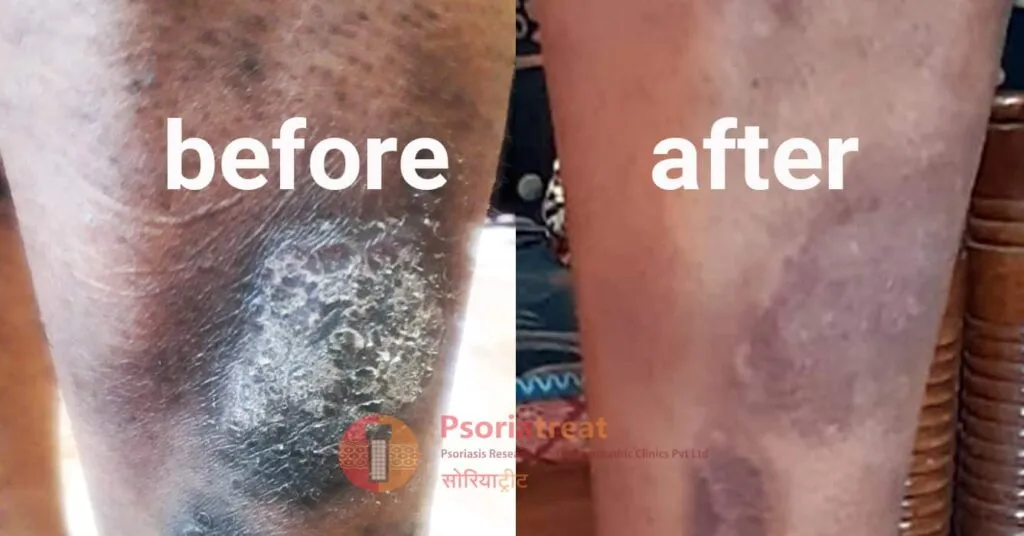How to Control Psoriasis in Winter
Psoriasis is a chronic skin disease that affects millions of individuals across the globe. While its severity can differ from person to person, many individuals experience worsened symptoms during the winter season. Cold, dry air and reduced sunlight can cause psoriasis flare-ups, which is upsetting and frustrating. In this exhaustive guide, we will investigate the causes of psoriasis exacerbation during winter and provide actionable advice on how to effectively manage psoriasis during the winter months.

Understanding Winter Psoriasis
Why Does Winter Make Psoriasis Worse?
Wintertime psoriasis flare-ups can be attributed to several factors:
The low humidity levels associated with cold weather can lead to chapped skin. Psoriasis is characterised by the rapid proliferation of skin cells, which can be exacerbated by dry skin, resulting in scaling and itching.
Reduced Sunlight: It is known that sunlight has a positive effect on psoriasis because it serves to slow the growth of skin cells. Winter’s shortened daylight hours and reduced exposure to natural sunlight can exacerbate psoriasis symptoms.
For many individuals, the holiday season combined with the difficulties of winter can be stressful. Since stress is a documented cause of psoriasis flare-ups, the winter months are especially vulnerable.
Cold Temperatures: Cold temperatures can aggravate psoriasis symptoms by causing skin trauma and irritation.
Identifying Psoriasis Winter Triggers
Before delving into strategies for managing psoriasis in winter, it’s essential to identify specific triggers that worsen your condition. Record when your flare-ups occur and what may be causing them in a journal. Common precipitants include:
- Stressful circumstances
- Indoor dry heating
- Heavy apparel that causes skin irritation
- Inadequate skin maintenance practices
Winter Psoriasis Management

Maintain Skin Hydration
Skin dehydration is one of the primary concerns during the winter. To counter this:
1. Select a rich, hypoallergenic moisturiser and apply it liberally to maintain hydrated skin.
2. Apply a moisturiser immediately following a shower or bath to seal in hydration.
3. Avoid moisturisers with fragrances or scents, as they may contain irritants.
Make use of humidifiers
Since indoor heating systems can further dehydrate the air, you should consider installing a humidifier in your residence. This will aid in maintaining a more comfortable humidity level, preventing your epidermis from becoming excessively dry.
Warm Showers and Baths
In frigid weather, hot baths and showers may seem appealing, but they can actually aggravate psoriasis. Choose tepid water instead. Assembling a bath with colloidal oatmeal or Epsom salts can also help relieve irritated skin.
Select Psoriasis-Friendly Garments
Avoid donning clothing that is too snug, too heavy, or made of wool, as they can irritate your skin and cause flare-ups. Choose cotton or other loose-fitting, breathable fabrics instead.
Use of Psoriasis Severity Calculator
You can use our psoriasis severity calculator to check your severity. To check, click here
Sunlight Experiencing
Since diminished sunlight is a contributing factor to winter psoriasis flare-ups, take advantage of the available sunlight. Even during the winter months, it is beneficial to spend some time outdoors to obtain natural sunlight exposure. Simply apply sunscreen to any areas that are not psoriasis-affected.
Stress Administration
Wintertime tension management is essential for psoriasis control. Consider employing mindfulness practises, yoga, meditation, or even psychotherapy to reduce tension levels.
Regular Skincare Routine
Maintain a hygiene regimen consisting of gentle cleansing and moisturising. Choose fragrance-free, hypoallergenic products over harsh cleansers.
Topical Therapy
Even during the winter, keep applying topical treatments as your dermatologist has advised. These medications can help effectively manage psoriasis symptoms.
Remain hydrated and eat healthily
Hydration and a healthy diet can have a positive effect on the health of your epidermis. Consume an abundance of water and foods rich in antioxidants and omega-3 fatty acids.
Consult with a Dermatologist
Consult a dermatologist if your psoriasis symptoms worsen or become unmanageable during the winter. They can provide personalized guidance and may modify your treatment plan as necessary.
The conclusion
Wintertime psoriasis can be difficult to control and manage, but with the proper strategies, you can do so successfully. You can appreciate the winter months with improved skin health if you comprehend the triggers, maintain a consistent skincare routine, and make lifestyle adjustments. Remember that psoriasis management is extremely individual, so consult your dermatologist for personalized guidance and treatment options. You can keep your psoriasis symptoms under control throughout the winter season and beyond with diligence and perseverance.
Send Us any Query by filling out the below form
*Disclaimer: It is important to note that every patient is unique, and individualized treatment plans should be formulated under the guidance of qualified healthcare professionals.


